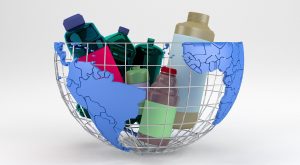Digitalization is transforming the way we live, interact and work in the 21st century and is permeating into all areas and sectors, including environmental technology. This progress has allowed a more efficient waste management regime and thus reduce the amount of raw material extracted or imported, avoiding the environmental and climatic impacts associated with them according to the Digitalization Report of the European Topic Center.
Nowadays, up to 50% of recycling plants in Europe include automated procedures of some kind, according to the Environment Journal. And among specific digital technologies currently used for collection, sorting and recycling purposes that are expected to have a major impact on the efficiency of the waste industry in the future include:
- Robotics: Advances in the automatic classification of waste thanks to image recognition as a result of the automation of technology, which allows up to 90% efficiency in this process.
- The Internet of Things (IoT): Smart containers with identification systems, level and temperature sensors and logistics optimization software.
- Cloud Computing: Thanks to the storage and processing of sensor data, it is possible to optimize workflows and detect failures in the classification processes.
- Artificial Intelligence (AI): Machine learning, which uses neural networks based on the use of data, is used for classification and pattern recognition in the context of waste management, improving the efficiency of classification.
- Data analysis: With data analysis, it is possible to monitor the collection vehicles, control the incineration processes of the plants and collect data through drones.
Technology: major presence in all waste collection areas
Digital technologies are increasingly applied in all areas of waste collection. The consequence of this has been that some aspects of this process have undergone changes, especially logistics (process of organization, scheduling and carrying out of tasks, personnel and vehicles). Here, digital tools offer the potential to improve the storage process by processing, analyzing and optimizing the necessary information. Thus, the data generated, for example, on the progress of the task or possible incidents, can be monitored in real time.
Other topics of interest: Plastic transformers: a growing industry
However, as greater volumes of information are collected, the complexity increases. In such cases, optimization algorithms help to find the most suitable options for allocating resources, such as labor or vehicles.
All these technological advances reduce the carbon footprint while providing a service more in line with the needs of citizens and the environment, recovering more materials and taking advantage of others that were previously discarded, which prevents them from ending up in places they shouldn´t be. Furthermore, due to the logistical challenge posed by waste treatment and therefore labor costs, digitization offers opportunities to reduce costs and create better job opportunities in the higher value parts of the business chain.







